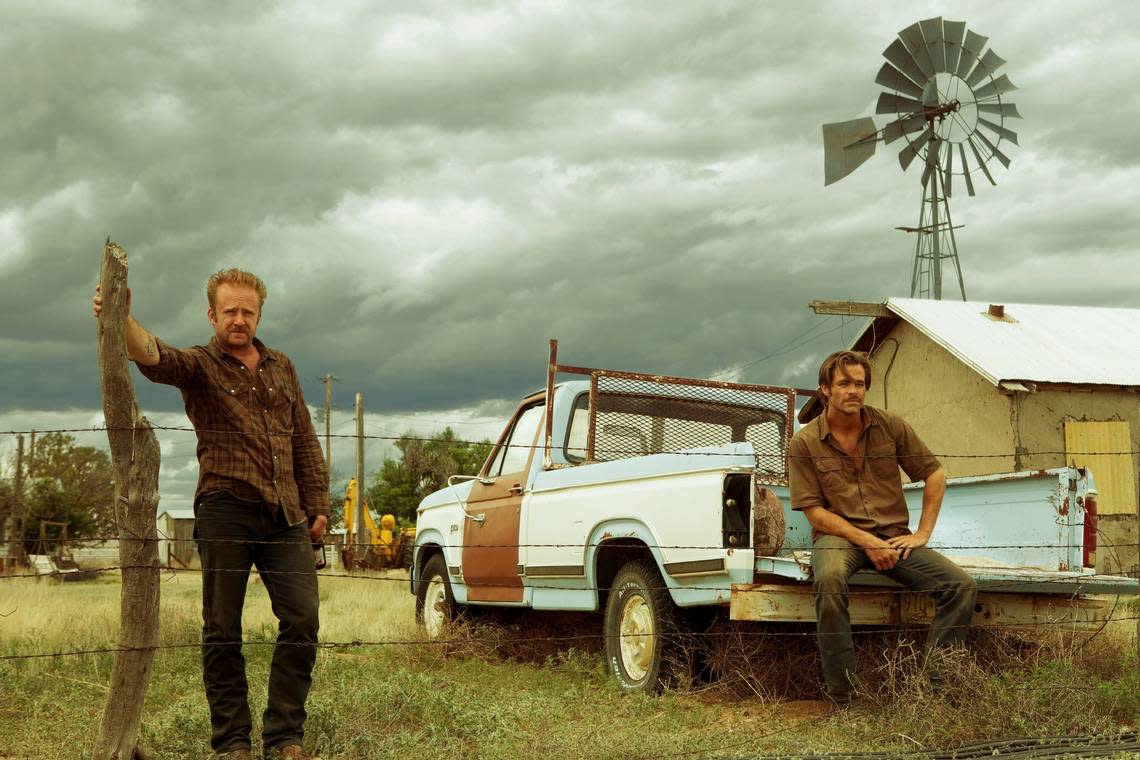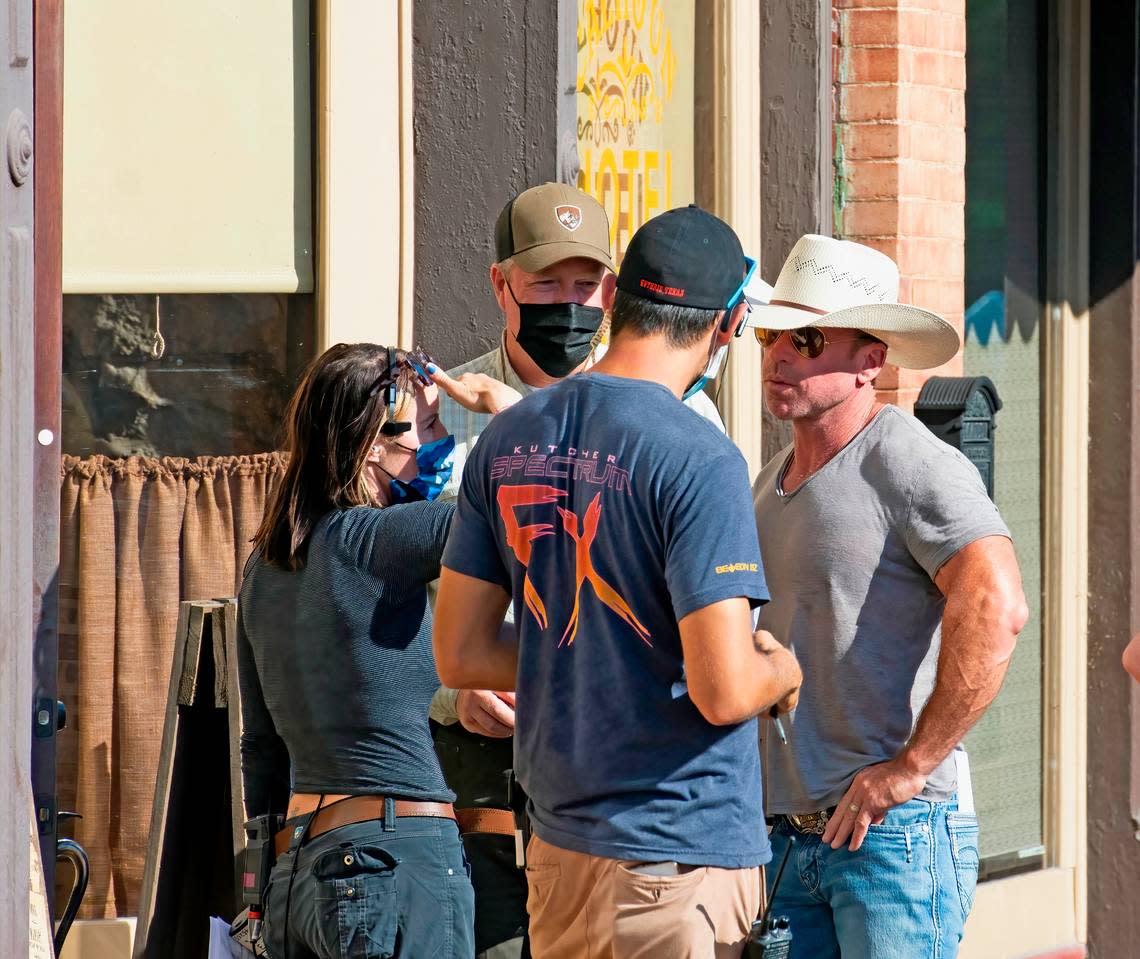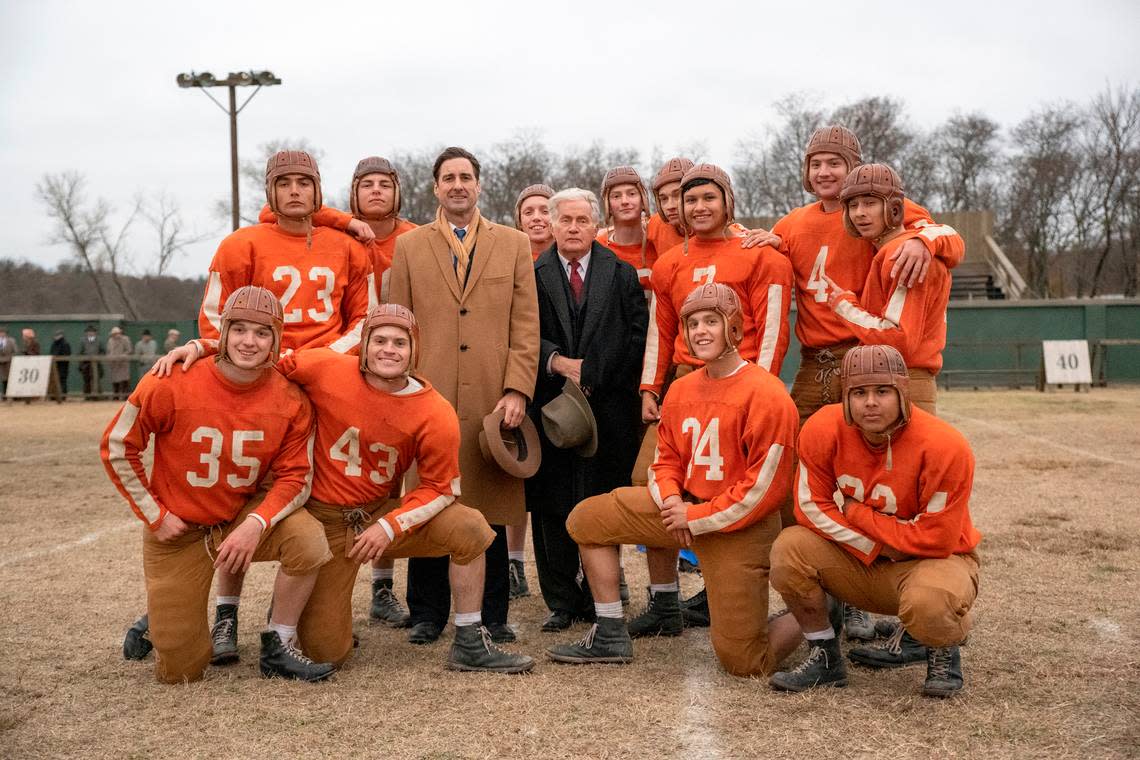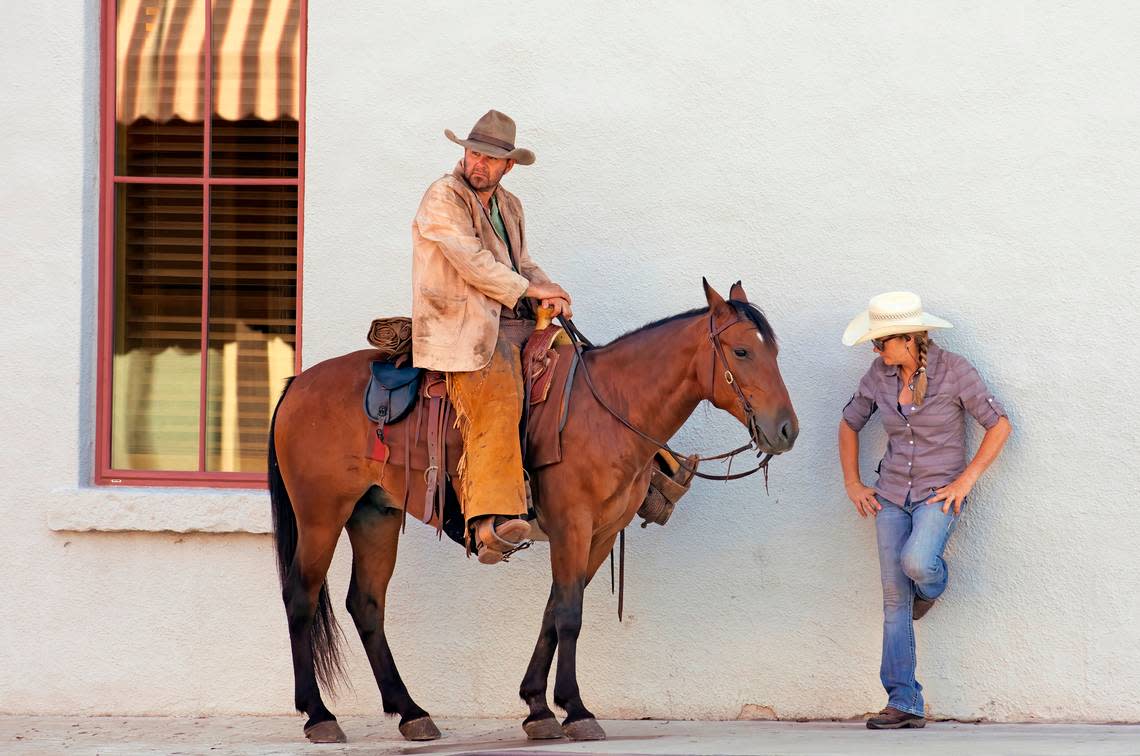More ‘Yellowstone’ in Texas? Here’s how the state is working to lure the film industry
The trailer opens with a pickup driving down a small-town road.
A printing shop and an appliance store are among the red brick buildings that line the street. The scene cuts to an office, and the audience sees an acoustic guitar leaning against a stone wall before the shot fades to “Texas Midlands Bank.”
Later we see men in cowboy hats and sprawling yellow-green grasslands.
The scenes in “Hell or High Water,” a 2016 movie written by Fort Worth Paschal graduate and “Yellowstone” creator Taylor Sheridan, are quintessential rural Texas.
It’s one example of how the state’s personalities, history and diverse landscape have inspired filmmakers for generations, from the beams of “Friday Night Lights” capturing the state’s love of high school football to Matthew McConaughey’s iconic “All right, all right, all right” delivered with a thick Texas drawl in “Dazed and Confused.”
But “Hell or High Water” wasn’t filmed in Texas.
It was shot in New Mexico, and it is among a long list of movies and shows that take place in Texas but were filmed somewhere else, including Oscar-winning “Dallas Buyers Club” (Louisiana) and true-crime drama “Candy” (Georgia).
A top tourism and economic development executive in the governor’s office offered a frank picture of Texas’ film industry in a February committee hearing: “We do not compete well with other states,” Adriana Cruz told lawmakers.

Could Texas one day be a hub for the film industry at a time when streaming apps have opened the door to a seemingly endless list of shows and movies?
Gov. Greg Abbott sees meaningful opportunities for film in the state.
“We just need to get it down into the details of it,” he said.
That’s where the Texas Legislature comes in.
Lawmakers in Austin are proposing bolstering film incentives to attract movies, television and other projects. Officials say Texas’ program has fallen short of other states. More film in Texas could be a way for the state and communities like Fort Worth to diversify their economy and attract business and tourism.
North Texas’ film industry has gotten recent attention with the help of Sheridan’s “Yellowstone” and “1883.” His show about frontier lawman Bass Reeves will shoot in Fort Worth, and Mansfield will one day be home to a film studio.
Attracting film to Texas is a top priority of Fort Worth Mayor Mattie Parker, who in a January interview said Texas’ incentive program is “woefully underfunded.”
Texas is missing out on projects to other states like Louisiana, New Mexico and Georgia, Parker said.
“Because the reality is, there are plenty of awesome opportunities and projects, and even longstanding film studio opportunities for the state of Texas that we just aren’t funding right now because we don’t have a robust enough fund,” Parker said.

Possibilities in North Texas
Cruz, the executive director of the Texas Economic Development and Tourism Division in Abbott’s office, sees the Fort Worth area as a success story.
Fort Worth Film Commissioner Jessica Christopherson described seeing growth in the city and region when it comes to projects showing interest in the area. Recent projects include “12 Mighty Orphans,” following the story of a football coach at a Fort Worth orphanage, and “Miss Juneteenth,” about a mother preparing her daughter for the Miss Juneteenth pageant.
In the past seven years, since the Fort Worth Film Commission was created, Christopherson said there’s been $555 million in economic impact, 19,000 jobs and around 300 projects.
The goal going forward in Fort Worth is to keep growing the industry and workforce.

“Looking ahead ... the ideal situation would be to continue to attract television series, films, commercials, you know, all of it to our area so that we can continue to create job opportunities and economic impact, including supporting hotels, local business,” Christopherson said.
Mansfield officials hope a film studio will draw industry interest. The $70 million project on 72 acres of land was recently approved by its city council. Mayor Michael Evans expects up to 2,000 jobs created, as well as other economic benefits through tourism.
He wants to see the film industry grow in Texas.
“We know that when municipalities prosper, then of course, it goes up straight,” Evans said. “The county will prosper as well as the entire state of Texas. I think it’s time for Texas to have that footprint in the movie industry, and I’m really excited about Mansfield starting to make that particular move forward toward the industry.”
But he was skeptical the state would expand its film incentives or invest more without seeing the benefit in action. Mansfield can be a test case.
“I don’t think though, my friend, that people are really going to get on board until they really see what benefit it actually has,” Evans said.
Parker, the city of Fort Worth, the Fort Worth Film Commission and the Texas Media Production Alliance are advocating for $200 million for Texas’ incentive program.
Early budgets filed in the House and Senate for 2024-2025 propose spending $45 million on the Texas Film Commission, including the incentive created in 2007 to attract film, television, commercial, animation, visual effect and video game projects to the state. The commission received the same allotment in the state’s 2022-2023 budget.
“The questions are obviously up in the air as to how close we can get to those numbers, but we know firsthand in Fort Worth that there are projects that are choosing other states because of a better incentive allotment for them, and for all the reasons we know well in Texas, they would rather do business here,” Parker said.
There’s potential for Fort Worth to be a leader in the film space, Parker said.
While she’s focused on film incentives at a state level, Parker didn’t rule out incentives from the city.
“If there are certain levels of support needed locally, and importantly on permanency — production studios here in Fort Worth — we absolutely would consider tax incentives for,” Parker said.
She would also support state-level incentives focused on tax credits, which have been proposed by lawmakers in Austin.
Gov. Greg Abbott’s vision for film in Texas
“Yellowstone” came to mind when Abbott thought about the type of projects he’d like to see in the state. The three-term governor has supported film incentives, even when some members of his own Republican Party have been opposed.
“Yellowstone” is set in Montana but is reminiscent of the folksy rancher lore associated with Texas.
Its creator Taylor Sheridan lives in Weatherford and part of the “Yellowstone” spin-off “1883” have been filmed in Fort Worth. Cowtown even hosted the premiere of season five of “Yellowstone.” Sheridan and Parker, Fort Worth’s Mayor, were recently in Austin together promoting the city’s film industry. Abbott met with Parker, and they discussed the film industry.
Abbott thinks state leaders can agree on investing in what he described as “conservative film” — projects like “Yellowstone” and “1883” that reflect more “traditional” values, rather than “agendas that are inconsistent with the majority of the political base” in Texas.
“What Taylor Sheridan is working on and with his background — it is more attractive to invest in projects like that than it is some entertainment options that would be antagonistic or hostile to what we consider to be Texas values,” Abbott said.
When looking at the state’s vision for film in Texas, Cruz, whose division houses the Texas Film Commission, wants to see diversity in filming locations. Much of the industry is concentrated in Texas’ urban areas. She also wants to see balance between types of projects, be it film production, visual effects, video games or another facet of the industry.
“We’re very proud of our Texas heritage, of our Texas stories and our Texas storytellers, and so we want to be sure that these stories are told here in our state,” Cruz said.
Parker stressed that projects that pay homage to Texas may translate better to skittish lawmakers.
“Another real positive about Taylor Sheridan and the 101 Studios work in Yellowstone and Paramount is the types of stories that they’re telling,” Parker said. “They feel very quintessential Texas, and they have a certain level of homage to our history and our heritage as a state and that Western way of life.”
Lt. Gov. Dan Patrick praised Sheridan, who in February toured the Senate with the influential Republican politician.
“My goal is for Taylor to move all of his TV and movie production to Texas,” Patrick said in a Feb. 15 newsletter. “Working together, I think we can get it done.”

Texas is on the radar of international and national film makers, said Marj Galas, the vice president of membership and industry relations for the Association of Film Commissioners International. Particularly when it comes to South by Southwest, a massive annual festival that starts Friday in Austin. Texas Association of Film Commissions is hosting a happy hour at the festival that night that is expected to include representatives from across the state, including Fort Worth.
“When you think about what are some of the ways that Texas can help grow interest and recognition and getting support, looking at some of the things that are already so successful right there, within the state, is a good place to start,” Galas said.
Should Texas invest more in film?
What would it take for Texas to be more competitive?
“It will take more money into the film industry because we have states like Georgia that spend far more on the film industry than ... the state of Texas, as well as some other states,” Abbott said in a Feb. 23 interview with the Star-Telegram.
Abbott’s proposed budget calls for “adequate funding” for the state’s Texas Moving Image Industry Incentive Program, but doesn’t specify a dollar amount.
Under the existing incentive program, Film and TV projects may qualify for a cash grant of 5% to 22.5% of eligible spending under the existing program. The projects would have to spend at least $250,000 in the state and at least 60% of production days in Texas. Seventy percent of paid cast and crew must be Texas residents. Texas also offers a separate incentive for building film production facilities in state.
In its first 15 years, program resulted in $1.95 billion in in-state spending — $5 spent in the state for every $1 spent by the state, according to the Texas Film Commission. More than 183,000 jobs have been created.
But Cruz, with the governor’s office, is hoping for improvement.
“I think that the cost of doing a TV series or a season of a TV series have gone up and perhaps the funding side has not kept up with, sort of,the marketplace,” Cruz said.
Incentives are always a hot-button topic, said Galas, from the Association of Film Commissioners International. States that have assessed their tax incentive programs have often found the programs don’t offer much return on investment and that economic development may be better achieved through other avenues, according to the National Conference of State Legislatures.
There’s historically been resistance from some Republican lawmakers who have pushed to eliminate funding for Texas’ incentive program.
But incentives are also always important when it comes to attracting film, Galas said.
“For producers and productions, incentives always are the first thing that they look for, because they’re looking for ways to save money on their productions,” Galas said. “It’s so expensive to shoot anything.
Rep. Matt Shaheen, a Plano Republican, is among those who have advocated against the fund. In a D Magazine article from 2017, he raised both moral and economic concerns, saying that state dollars are better focused on education, infrastructure and Child Protective Services.
About six years later, Shaheen still opposes film initiatives in the state. He said jobs brought the industry are temporary, though some supporters of film incentives disagree.
“Texas is so awesome. We’re so business friendly,” Shaheen told the Star-Telegram. “There are corporations moving to Texas all the time, and we just don’t need to take taxpayer dollars from sin.”
Rep. Mary González, an El Paso Democrat who chairs the subcommittee that oversees the programs’ funding, stressed that its important funding film doesn’t come at the cost of other state needs. She suggested that a portion of unused funds already allocated for the governor’s office be used for the expense.
Legislative proposals to boost Texas film
Fort Worth Rep. Nicole Collier, a Democrat, expressed interest in looking deeper into Georgia’s incentive program. Texas’ lack of competitiveness puts the state at risk of losing out on economic development the industry could bring in, she told the Star-Telegram in an interview after a March 2 committee hearing.
“It’s not just a one thing where they film and they leave,” she said. “People get jobs. People develop relationships and long lasting impacts.”
Georgia is often pointed to as a model for states breaking into the film industry. There, eligible projects get a 20% base tax credit and an extra 10% for including a logo that promotes the state.
Film productions spent $4.4 billion in Georgia in fiscal 2022. Movies filmed in the state in recent years include box office hits like “Avengers: Endgame” and “Spider-Man: No Way Home,” as well as popular TV series like season four of “Stranger Things.”
Producers in New Mexico could get a tax credit of up to 35% for qualified film expenditures. Louisiana offers tax credits of up to 40% on a base investment.
A proposal filed in the House and Senate would offer tax credits for productions that spend more than $15 million in the state and film at least 25% of the project in Texas. Among other potential credits, projects could get credits covering 30% of in-state spending, not including wages. To qualify, promotional material must be provided to the state for tourism and economic development.
“The more that’s invested, the more the credit will apply,” said Rep. Four Price, an Amarillo Republican who authored the House bill. “So we’re hopeful that what we do is establish a framework really encouraging more participation.”
Rep. Trent Ashby, a Lufkin Republican who chairs the House Culture, Recreation and Tourism Committee, is behind the proposal.
“I’m a big job creation, economic development guy,” Ashby said. “So, anything that the state can do to create jobs or to further bolster our economy, make it more diversified, resilient, I’m going to have open ears.”
Fort Worth area lawmakers on Thursday filed bills related to the film industry in Texas.
A bill filed by Rep. Salman Bhojani, a Euless Democrat, would increase the amount of money productions may qualify for under the state’s Texas Moving Image Industry Incentive Program to up to 30% of in-state spending.
A proposal from Rep. Craig Goldman, a Fort Worth Republican, would allow Texas A&M and Texas State to establish virtual film production institutes. It would also remove the cap on the number of media production development zones in the state — locations designated for tax exemptions for construction and improvement of production facilities.
“My goal this session is to pass legislation that attracts more film and TV production to the state of Texas,” Goldman said. “Because, and as Taylor Sheridan has locally proven, that when these productions come, so does an extremely beneficial economic impact to where he films.”
